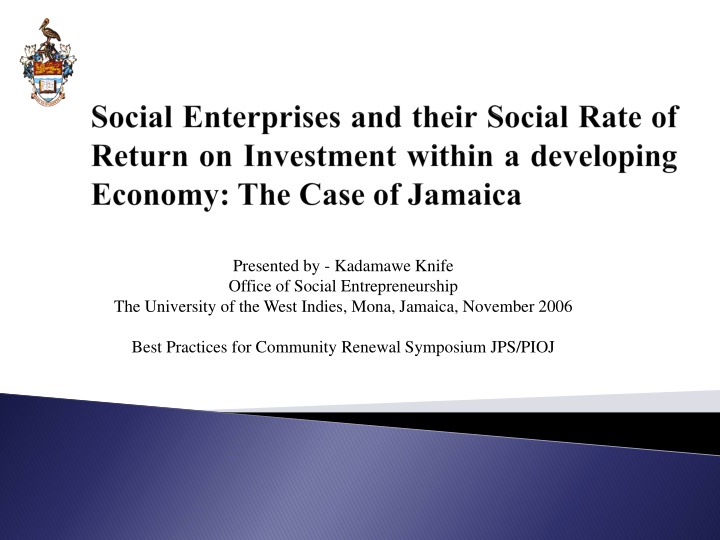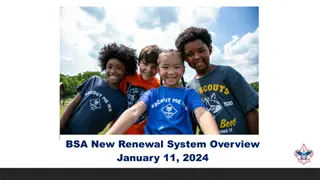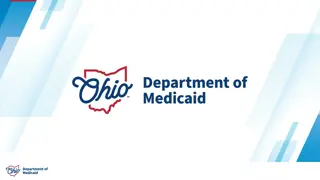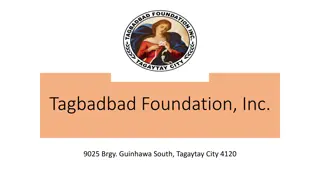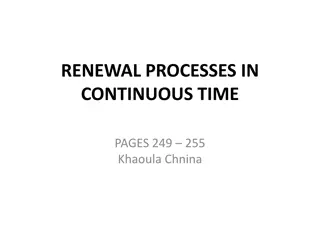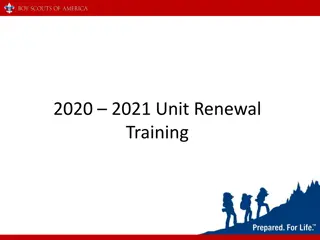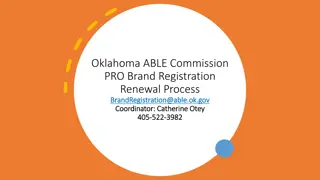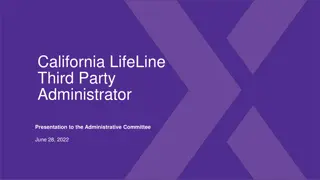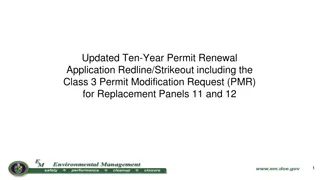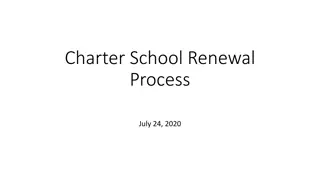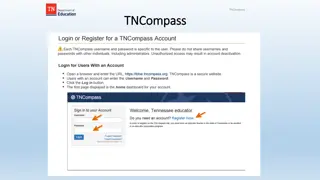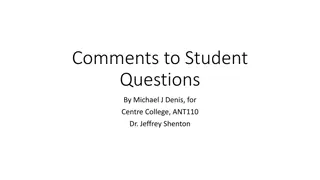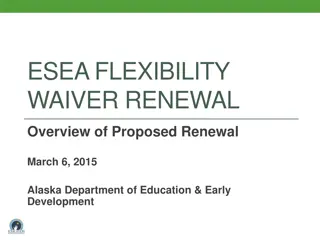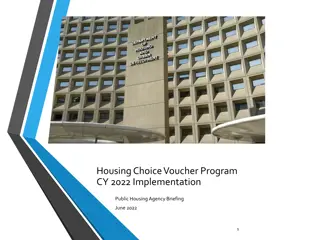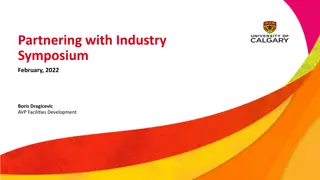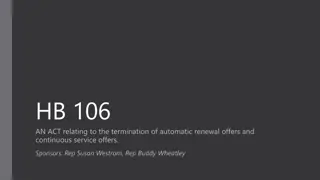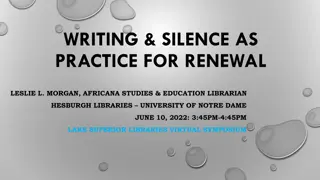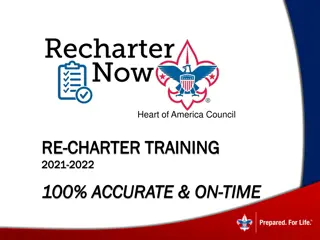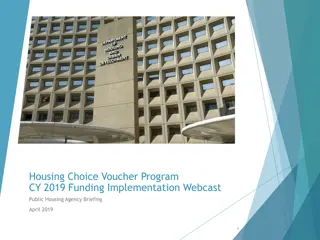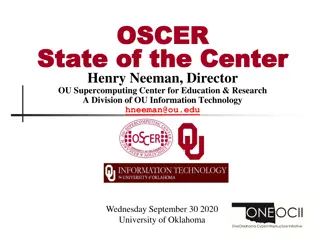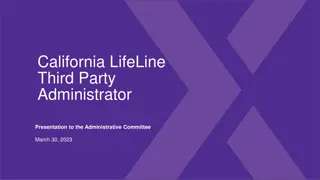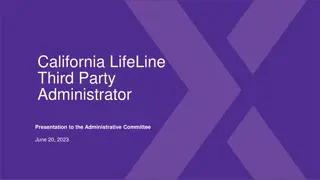Best Practices for Community Renewal Symposium
This content discusses the challenges and initiatives towards community renewal, focusing on social entrepreneurship, youth empowerment, economic inequality, and the importance of social progress indices. It also highlights the limitations faced by social organizations and the diverse organizational structures prevalent in the social sector.
Download Presentation

Please find below an Image/Link to download the presentation.
The content on the website is provided AS IS for your information and personal use only. It may not be sold, licensed, or shared on other websites without obtaining consent from the author.If you encounter any issues during the download, it is possible that the publisher has removed the file from their server.
You are allowed to download the files provided on this website for personal or commercial use, subject to the condition that they are used lawfully. All files are the property of their respective owners.
The content on the website is provided AS IS for your information and personal use only. It may not be sold, licensed, or shared on other websites without obtaining consent from the author.
E N D
Presentation Transcript
Presented by - Kadamawe Knife Office of Social Entrepreneurship The University of the West Indies, Mona, Jamaica, November 2006 Best Practices for Community Renewal Symposium JPS/PIOJ
New Generations Millennial and Indigo Children No meaningful growth in 5 decades uncertainty surrounding stability of local currency SDGs/MDGs High rates of distrust and perception of crime - Gini Coefficient Increasing above 4 Asset Gini Coefficient 7.26 high levels of inequity High happiness index ranking High social index ranking 43/142 Series of Research being done on Social Economy by OSE - UNDP. USAID/JCF , DIGICEL Fnd, USAID/COMET I&II, USAID/JN Foundation I&II, Revised MSME and Entrepreneurship Policy JPS Symposium 2016 2
The Social Progress Index - creates a holistic and robust measurement framework for national social and environmental performance that can be used by leaders in government, business and civil society at the country level as a tool to benchmark success, improve policy, and catalyze action Three dimensions of the Social Progress Index Framework: 1. Basic Human Needs, 2. Foundations of Wellbeing, and 3. Opportunity. Jamaica is ranked 43 out of a 132 although Per Capita is not amongst the highest. JPS Symposium 2016 3
Mixed method approach Surveyed 100 social enterprises In operation for 2 or more years. Response rate of 70% Financials were obtained from only 38 enterprises.
Limitations Non-existence of a single registry for social organisation/ social enterprises. Lack of proper accounting and record keeping
Organisation al al structure Organisation structure Emerging Ideation Emerging Transitioning Not-for- profit Transitioning Hybridisation Private sector Hybridisation Governme nt Start-up MSME CBOs, Youth groups, Individuals. CBOs, Youth groups, Advocacy groups. NGOs, CBOs, FBOs, Advocacy groups. Cooperatives, microenterpri ses, Agriculture groups, Cottage industries. Foundation s, Agencies and Departme nts; Quasi- governme nt agencies. Groups Groups CSOs, Charities, Service Clubs.
60.00% 55.81% Micro employees Micro: 1-10 50.00% Small employees Small: 11-50 39.53% 40.00% Medium 51-150 Medium employees 30.00% 20.00% Large 150 employees Large: greater than 10.00% 2.33% 2.33% 0.00% Micro Small Medium Large
Economic or Trade Activities Economic or Trade Activities Industries Industries Other Administrative and 3% 0.00% Other 37.5% Building Cleaning, Pest Control 4% Gain business through open tenders for government or other contracts 8.6% Employment Services 7% 10.6% 10.0% Professional, Scientific and 3% Provide a mechanism for members to trade with each other Rental, Hiring and Real Estate 1% 10.6% Financial and Insurance Services 1% Provide a mechanism for producers to sell their goods 18.6% Information, Media and 3% 15.4% 11.4% Transport, Postal and 0% Provide the use of capital assets for a fee Social Assistance Services 6% 14.4% Residential Care Services 3% 47.1% Provide services for a fee Hospital, Medical and Other 1% 30.7% 22.9% Arts and Recreation Services 26% Retail or wholsale goods Food & Beverage Services 9% 15.4% Accommodation 3% 64.3% Produce goods for Sale Retail Trade 56% 28.9% Wholesale Trade 13% Education & Training 16% 2015 2013*
Year of Operation Operation Years VS Economic Trading Years Operation Years VS Economic Trading Years 41.3% 38.5% 35.7% 35.7% 25.7% 25.7% 22.2% 21.4% 17.1% 12.7% 11.1% 2-5 years 6-10 years 11-20 years More than 20 years 2-5 years 6-10 years More than 10 years Years of Operation Years of Trading/ Economic Activity
Grant VS Turnover & Trading Grant VS Turnover & Trading Income- -Source Comparison Income Source Comparison 350,000,000.00 79.3% 300,000,000.00 Turnover 250,000,000.00 17.9% 200,000,000.00 J$'000 J$'000 150,000,000.00 20.7% Funding From Grants 100,000,000.00 64.7% 50,000,000.00 - 2015 2013* Overall Grants Received Grants Received Turnover Profit Loss 2014-2015
Male Male Female 30- 59 143 34.5 Female 29 & younger 76 49.4 30- 59 59 38.3 60 29 & younger 100 24.1 60 Total Total &Older 19 12.3 &Older 18 4.3 Total 154 28.5 Total 261 37.7 Full Time % % Part Time % % Voluntee r r % % Total % % Full Time 415 33.7 Part Time 55 37.4 84 57.1 8 147 27.2 47 22.9 53 25.9 105 51.2 205 29.6 352 28.5 5.4 Voluntee 141 58.8 272 50.3 92 38.3 235 43.4 7 240 44.4 541 43.9 132 58.4 279 40.3 91 40.3 287 41.5 3 226 32.7 692 56.1 466 37.8 1233 2.9 34 6.3 1.3 126 18.2 Total 1233 Sector remains heavy dependent on volunteerism (37.8%). Contributed 767 jobs that paid a salary 415 full-time posts. Sector employed 278 278 youth (between the ages of 14 and 29). Sector employed 692 261 205 692 females females 261 full-time 205 part-time
Social Enterprises through their triple bottom, generate significant, economic, social and environmental value. It is through this that the social economy and the social index outperforms the traditional economic-driven indices QUADRUPLE Bottom Line for countries like Jamaica emphasis on the generating and sustaining Cultural Value note Jamaica Global Cultural Footprint and the value or the creative industries Entertainers as professionals (individual or group) give back the most and has established the most Foudations. JPS Symposium 2016 14
Assigning monetary values to economic, social, cultural and environmental returns provides an opportunity to demonstrate wider value creation Alternative business philosophy and process Innovative ways of obtaining economic growth, social development and environmental sustainability for all people on the planet Process of addressing market and government failures JPS Symposium 2016 15
Measuring social benefits of nonprofit activity is not easy - benefits are difficult to define, no common understanding of what those benefits are or ought to be exists PROXIs SROI is a process that feeds into an assessment map it places a monetary value on the outcomes/benefits, so that they can be added up and compared with the costs/investment JPS Symposium 2016 16
Assesses the efficiency of an intervention Lifelong performance indicator of social enterprises and social ventures Monitor performance; to attract external funding; and to reinforce the missions of social ventures Use to leverage for funding support to decision-making SROI analysis can provide legitimacy to NPOs or their funders, Assist in allocating resources efficiently and effectively JPS Symposium 2016 17
Comparing interventions using SROI is difficult as institutional contexts of the target groups whose social needs are served varies (Lingane & Ol- sen, 2004; Scholten, 2005). Three technical issues: the use of discount values - inflationary rates the incorporation of overhead costs underestimating or omitting some operations cost determinations of the counterfactual - dead weight and attribution concerns JPS Symposium 2016 18
Cost Price methods Incurred Losses Method Cost Reduction Method Averting Behaviour Method Cost Price based methods based Value Value- -based methods based methods Price Sensitivity Meter Hedonic Price Method Cost Prevention Method Travelling Costs Method Restoration Cost Method Production Factor Method Added Value Method JPS Symposium 2016 20
Two Forms of Social Enterprises - Enterprise s operations linked into its mission SEs operation provides employment 1. 2. Examine the ROI of SEs from both classifications. Forward Step Foundation provides training and establishing enterprises where beneficiaries are actively engage in providing goods and services The New Horizon Christian Ministries - provide training and certification, enabling its participants to earn an income, reduces crime as well as protects the environment. 1. 2. JPS Symposium 2016 21
The Forward Step Foundation (FSF) was setup in 2006 to cater to the needs of the youths within the community of Gregory Park, in an effort to facilitate community regeneration through constructive application. The FSF fulfills its mission using a phased approach. First phase focuses on implementing the Liveli-Up-Yuhself Initiative, A Come Unity Sustainability Programme which provides training for 25 at risk youths within the Gregory Park and surrounding area. These participants are exposed to life skills training in arts and craft, creative arts (studio engineering and music development) and carpentry out of which three enterprises are established providing employment to participants JPS Symposium 2016 22
Grant funding of J$2,594,000 invested yielded a return of 106% after discounting. Total Social and Economic benefit = J$2,889,000 Discounted by 5% for attribution = J$ SROI = 2759300/2594000 1.06 This amounts to a return of 106%. For every dollar of the J$2594,00.00 invested a return of J$1.06 on every dollar invested can be expected. JPS Symposium 2016 24
There are several social issues within this jurisdiction: inefficient waste disposal and management practices inadequate resilience with regards to climate change. increasing unemployment and underemployment among youths. low self-esteem within youths in the community All of which may encourage youth engagement in illegal enterprise activities. JPS Symposium 2016 25
New Horizon Ministries (NHCOM) established a Climate Change and Community Strengthening Initiative within Golden Acres and adjoining communities. The program provides technical training in the area of metal fabrication to aid in the recycling/waste management initiative - as well as programmes to improve literacy and increase HIV awareness for approximately 56 youth living within the community. Lizard Town; Golden Acres; Board Villa; Back Bush; Coles Pen; McKoy Lands JPS Symposium 2016 26
Grant funding of J$22413510.00 invested yielded a return of 1045% after discounting. Total Social and Economic benefit = J$20172759.00 Discounted by 10% for deadweight = J$1929880.00 SROI = 20172759.00/1929880.00 10.45 This amounts to a return of 1045%. For every dollar of the J$1929880.00 invested a return of J$10.45 on every dollar invested can be expected. JPS Symposium 2016 28
The Social Economy and SEs are keys in the transformation process as they generate significant SROI evidence by Social Index Ranking Imperative not to over-estimate or underestimate value creation use of proxies and monetization are crucial to evidence efficacy of social investments JPS Symposium 2016 29
Love in the House JPS Symposium 2016 30
